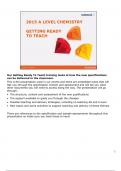Topic 6 chemistry gcse - Study guides, Class notes & Summaries
Looking for the best study guides, study notes and summaries about Topic 6 chemistry gcse? On this page you'll find 29 study documents about Topic 6 chemistry gcse.
All 29 results
Sort by
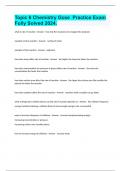
-
Topic 6 Chemistry Gcse Practice Exam Fully Solved 2024.
- Exam (elaborations) • 3 pages • 2024
-
Available in package deal
-
- $7.99
- + learn more
what is rate of reaction - Answer how fast the reactants are changed into products example of slow reaction - Answer rusting of metal example of fast reaction - Answer explosion how does temp affect rate of reaction - Answer the higher the temp the faster the reaction how does concentration (or pressure of gases) affect rate of reaction - Answer the more the concentration the faster the reaction how does surface area affect the rate of reaction - Answer the larger the ...
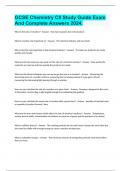
-
AQA GCSE Chemistry(current Exams Fully Solved 100%) Study Bundle guaranteed success 2024.
- Package deal • 19 items • 2024
-
- $25.49
- + learn more
1 Exam (elaborations) GCSE Chemistry C8 Study Guide Exam And Complete Answers 2024. 2 Exam (elaborations) GCSE Chemistry C8 Study Guide Exam And Complete Answers 2024. 3 Exam (elaborations) GCSE AQA Chemistry Topic 9- Chemistry of the Atmosphere Test Questions Well Answered 100% 2024. 4 Exam (elaborations) Topic 6 Chemistry Gcse Practice Exam Fu
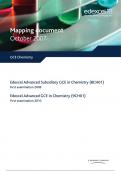
-
Advanced GCE in Chemistry (9CH01)
- Exam (elaborations) • 16 pages • 2024
-
- $10.49
- + learn more
Introduction 1 Mapping of the new GCE in Chemistry (8CH01/9CH01) to the current Edexcel and Nuffield specifications 2 Unit 1: The Core Principles of Chemistry 2 Unit 2: Application of Core Principles of Chemistry 4 Unit 4: General Principles of Chemistry II — Rates, Equilibria and Further Organic Chemistry 6 Unit 5: General Principles of Chemistry II — Transition Metals and Organic Nitrogen Chemistry 9 Edexcel AS/A GCE in Chemistry (8CH01/9CH01) — Mapping document 1 Introd...
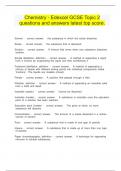
-
Chemistry - Edexcel GCSE Topic 2 questions and answers latest top score.
- Exam (elaborations) • 4 pages • 2024
-
- $7.99
- + learn more
Chemistry - Edexcel GCSE Topic 2 questions and answers latest top score. Solvent m- m mcorrect manswer. m m mthe msubstance min mwhich mthe msolute mdissolves Solute m- m mcorrect manswer. m m mthe msubstance mthat mis mdissolved Solution m- m mcorrect manswer. m m mA mmixture mthat mforms mwhen mone msubstance mdissolves manother. Simple mdistillation, mdefinition m- m mcorrect manswer. m m mA mmethod mof mseparating ma mliquid mfrom ma mmixture mby mevaporating mthe mliquid m...
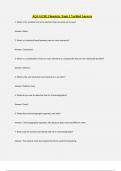
-
AQA GCSE Chemistry Topic 1 Verified Answers
- Exam (elaborations) • 8 pages • 2024
-
Available in package deal
-
- $9.83
- + learn more
AQA GCSE Chemistry Topic 1 Verified Answers 1. What is the smallest unit of an element that can exist on its own? Answer: Atom. 2. What is a chemical bond between two or more elements? Answer: Compound. 3. What is a combination of two or more elements or compounds that are not chemically bonded? Answer: Mixture. 4. What is the sum of protons and neutrons in an atom? Answer: Relative mass. 5. What do you use to draw the line for chromatography? Answer: Pencil. 6. What does c...
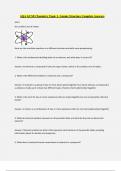
-
AQA GCSE Chemistry Topic 1- Atomic Structure Complete Answers
- Exam (elaborations) • 5 pages • 2024
-
Available in package deal
-
- $9.96
- + learn more
AQA GCSE Chemistry Topic 1- Atomic Structure Complete Answers atom the smallest unit of matter Here are the rewritten questions in a different structure and with some paraphrasing: 1. What is the fundamental building block of an element, and what does it consist of? Answer: An element is composed of only one type of atom, which is the smallest unit of matter. 2. What is the difference between a molecule and a compound? Answer: A molecule is a group of two or more atoms joined toget...
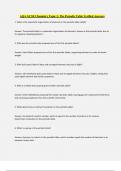
-
AQA GCSE Chemistry Topic 2- The Periodic Table Verified Answers
- Exam (elaborations) • 4 pages • 2024
-
Available in package deal
-
- $11.00
- + learn more
AQA GCSE Chemistry Topic 2- The Periodic Table Verified Answers 1. What is the systematic organization of elements in the periodic table called? Answer: The periodic table is a systematic organization of elements, known as the periodic table, due to its regularly repeating patterns. 2. Who was the scientist who proposed one of the first periodic tables? Answer: John Dalton proposed one of the first periodic tables, organizing elements in order of atomic weight. 3. Who built upon Da...
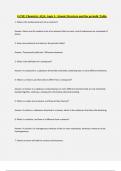
-
GCSE Chemistry AQA: topic 1- Atomic Structure and the periodic Table.
- Exam (elaborations) • 5 pages • 2024
-
- $10.48
- + learn more
GCSE Chemistry AQA: topic 1- Atomic Structure and the periodic Table. 1. What is the fundamental unit of an element? Answer: Atoms are the smallest units of an element that can exist, and all substances are composed of atoms. 2. How many elements are listed on the periodic table? Answer: The periodic table lists 118 known elements. 3. What is the definition of a compound? Answer: A compound is a substance formed by chemically combining two or more different elements. 4. What is a...
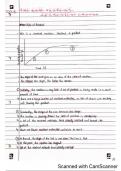
-
GCSE AQA Chemistry Topic 6 - The rate and extent of chemical change
- Summary • 14 pages • 2024
-
- $9.31
- + learn more
Grade 9 GCSE AQA Chemistry notes for Topic 6 (The rate and extent of chemical change). Sticks very closely to the specification. These notes contain everything you need to memorise to get a grade 9: nothing more, nothing less. I recommend making flashcards from these notes and memorise them.

How much did you already spend on Stuvia? Imagine there are plenty more of you out there paying for study notes, but this time YOU are the seller. Ka-ching! Discover all about earning on Stuvia

